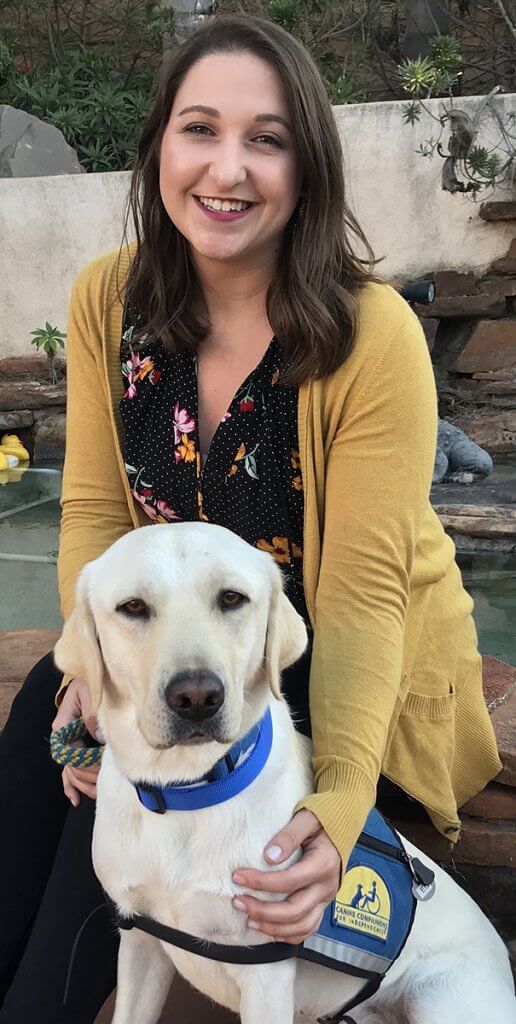Science has shown that service dogs can benefit some veterans with PTSD. But the exact role service dogs play in the day-to-day lives of veterans – and the helpfulness of the tasks they perform – is less known. A recent study led by the Purdue University College of Veterinary Medicine shows what trained tasks service dogs perform the most often and which ones are the most helpful to veterans with post-traumatic stress disorder. The study found that the task of disrupting episodes of anxiety ranked among the most important and most often used.
“There has been some debate on what kind of training PTSD service dogs need to be effective and how their assistance may be different than what a pet dog can provide,” said Kerri Rodriguez, PhD, a human-animal interaction graduate researcher and lead author on the study. “This study suggests that veterans are, in fact, using and benefiting from the specific trained tasks, which sets these dogs apart from pet dogs or emotional support dogs.”
Dr. Rodriguez led the work with Dr. Maggie O’Haire, associate professor of human-animal interaction in the Department of Comparative Pathobiology. Their research was published in Frontiers in Psychology. The study was done in conjunction with K9s For Warriors, with support and funding from Merrick Pet Care, and is in preparation for an ongoing large-scale clinical trial that is studying veterans with and without service dogs over an extended period of time.

The study found that, on average, the dog’s training to both alert the veteran to any increasing anxiety and providing physical contact during anxiety episodes were reported to be the most important and the most often used in a typical day. Veterans with a service dog also rated all of the service dog’s trained tasks as being “moderately” to “quite a bit” important for their PTSD.
Some trained tasks include picking up on cues veterans display when experiencing distress or anxiety and consequently nudging, pawing or licking them to encourage the veteran to focus on the dog. The service dogs also are trained to notice when veterans are experiencing anxiety at night and will actively wake up the person from nightmares. The dogs also are trained to perform tasks in public – such as looking the opposite way in a crowded room or store to provide a sense of security for the veteran. In addition, the study found that trained service dog tasks were used on average 3.16 times per day, with individual tasks ranging from an average of 1.36 to 5.05 times per day.
Previous research led by Dr. Rodriguez showed that the bond between a service dog and the veteran was a significant factor in the importance of untrained behaviors. Although all trained tasks were reported to be important for veterans’ PTSD, those with a service dog actually rated the importance of untrained behaviors higher than the importance of trained tasks. This suggests that there are some therapeutic aspects of the service dog’s companionship that are helping just as much, if not more, than the dog’s trained tasks, Dr. Rodriguez said. “These service dogs offer valuable companionship, provide joy and happiness, and add structure and routine to veterans’ lives that are likely very important for veterans’ PTSD.”
The study surveyed 216 veterans from K9s For Warriors, including 134 with a service dog and 82 on the waitlist. The study complements a previous publication published last year that focused specifically on the service dogs’ training, behavior and the human-animal bond.
While service dogs were reported to help a number of specific PTSD symptoms such as having nightmares, experiencing flashbacks, or being hyperaware in public, there were some symptoms that service dogs did not help, such as amnesia and risk-taking. “Both this research, as well as other related studies on PTSD service dogs, suggest that service dogs are not a standalone cure for PTSD,” Dr. O’Haire said. “Rather, there appear to be specific areas of veterans’ lives that a PTSD service dog can help as a complementary intervention to other evidence-based treatments for PTSD.”
Veterans on the waitlist to receive a service dog expected the service dog’s trained tasks to be more important for their PTSD and used more frequently on a daily basis than what was reported by veterans who already had a service dog. “Veterans on the waitlist may have higher expectations for a future PTSD service dog because of feelings of hope and excitement, which may not necessarily be a bad thing,” Dr. Rodriguez said. “However, it is important for mental health professionals to encourage realistic expectations to veterans who are considering getting a PTSD service dog of their own.”
The study was funded by Merrick Pet Care, Newman’s Own Foundation and the Purdue University College of Veterinary Medicine. Click here for more information about Dr. O’Haire’s research, or visit the website for the Organization for Human-Animal Interaction Research and Education (OHAIRE).
